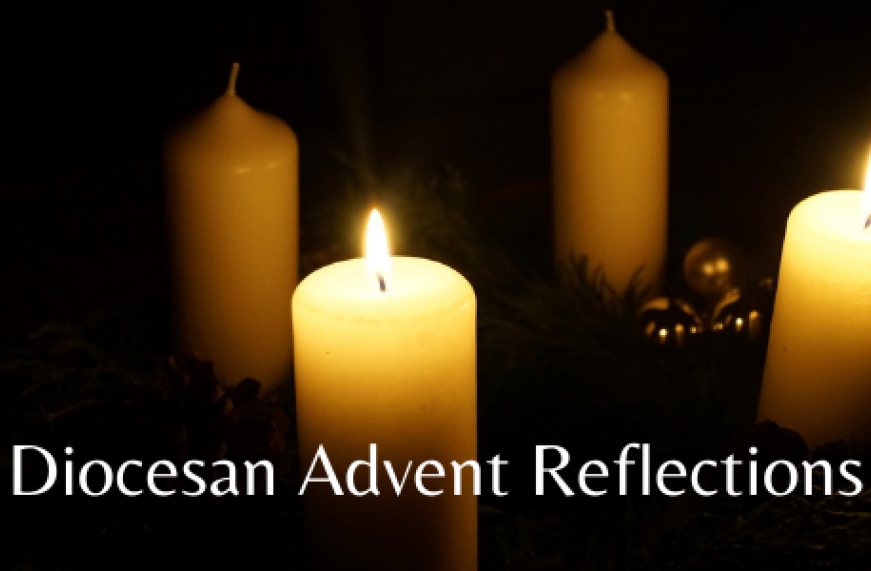Daily Advent Reflection: December 11

Second Friday of December
Psalms 31 · 35
Isa. 7:10-25
2 Thess. 2:13-3:5
Luke 22:14-30
When I am expecting a special guest, I clean house. I make sure that the bathrooms and floors are clean, that the house is dusted, and that the pet hair is vacuumed from the furniture. When my guest arrives, they have no idea if I am a good housekeeper or if I made a special effort for them… and I do not want them to know! They do not need to know about the dust, dirt, pet hair, or grime that was there and in what measure it was there before. All they need to know is that my house is clean now.
I don’t think we talk enough about purgation in the church. Purgation is the purifying or cleansing of something. During this time of Advent, we are called to prepare for the coming of not just a special guest, but the most special guest, for Christ our Lord and King. If Christ were to come to your actual home, wouldn’t you want to clean ahead of time? Wouldn’t you want to purge out that which is making your home dirty? That is our opportunity in Advent. We need to purge out that which is making our spiritual houses, our bodies and souls, unclean. I could go through the seven deadly sins, but the one I’m most concerned about lately is wrath. Everyone seems so angry now days. For instance, some are angry that people want them to wear masks; some are angry that people won’t wear masks; some are angry that people are wearing masks, but their nose is out. If we want to be angry, all we have to do is turn on the news or look at our social media platforms.
If anyone had a reason to be angry, it was Jesus. Jesus knew that he was going to be betrayed by one of the twelve. We know from scriptures that more than the twelve followed Jesus. From the very beginning, from the Baptism of John, Matthias and Joseph called Barsabbas followed Jesus (Acts 1:21-23). Matthew and Luke both talk about the women who had followed Jesus from Galilee and provided for him (the women bankrolled his ministry). From this crowd of followers, Jesus had just 12 men in his inner circle, and it was one of these closest and most trusted that betrayed him.
Betrayal is probably the greatest reason to be angry, and yet…
Jesus knew Judas was going to betray him and he ate with him anyway.
Jesus knew Judas was going to betray him and he washed his feet along with the other disciples’ feet anyway.
Jesus knew Judas was betraying him, and he prayed for deliverance in the garden anyway.
Jesus knew full well what was happening, but received the kiss of betrayal from Judas anyway.
Jesus must have been at least partially in the mindset of the psalmist: “Even my best friend, whom I trusted, who broke bread with me, has lifted up his heel and turned against me.” Jesus had every right to be hurt and angry. Judas’ betrayal led to the cross, but despite that betrayal, Jesus healed the soldier’s ear, surrendered peacefully, and asked forgiveness for those who mocked, scourged, and crucified him, for they knew not what they had done.
I think we need to be like Jesus in dealing with anger. I think we need to be in community with those who anger us. We need to serve those who anger us. We need to pray for those who anger us and pray they do not live up to our worst expectations. We need to allow those who anger us to approach us. In our baptismal promises we profess that we will seek and serve Christ in all persons, which includes those who anger us. By communing with, serving, praying for, and allowing familiarity, we will likely not change them, but we may just change ourselves.
Ready yourself for the Advent coming of Christ. Prepare your spiritual houses by purging the sin that makes us all unclean. When we repent, confess our sins, and ask forgiveness, God forgives and forgets. When Jesus arrives, he won’t remember how much dirt and grime were there before you cleaned your spiritual house because the sin has already been purged. While you are cleaning house, maybe start by purging the anger, that wrath that is all around us and is mucking up our lives.
The Rev. Mindy Valentine Davis
St. Peter’s Episcopal Church, Fort Atkinson
